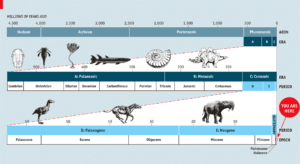Anthropocene Epoch: Meaning and Debates
- Context: Scientists recently proposed to formalise an ‘Anthropocene Epoch’ on the geologic time scale, triggering several debates.
Analysis
Background
- The Geologic Time Scale is the “calendar” for events in Earth history.
- All 4.6 billion years of Earth’s history are split into—in descending order of duration—Eons, Eras, Periods, Epochs and Ages – as designated by the International Commission on Stratigraphy.

- The enumeration of these geologic time units is based on stratigraphy, which is the correlation and classification of rock strata (horizontal layers of sedimentary rock).
- As the earth’s surface evolves, new layers of rock, soil, and other materials are deposited on old ones. Each layer, or stratum, is thus a marker of a previous era.
- The fossil forms that occur in the rocks, however, provide the chief means of establishing a geologic time scale, with the timing of the emergence and disappearance of widespread species from the fossil record being used to delineate the beginnings and endings of ages, Epochs, periods, and other intervals.
- At present we are in Phanerozoic Eon, Cenozoic Era, Quaternary Period, Holocene Epoch and Meghalayan Age (past 4,200 years).
- The Earth’s current Epoch, the Holocene, started at the end of the last ice age, around 12,000 years ago.
Holocene to Anthropocene Epoch
- The Earth is 4.5 billion years old, and modern humans have been here for around a mere 200,000 years.
- Yet in that time we have fundamentally altered the physical, chemical and biological systems of the planet on which we and all other organisms depend.
- In the past 60 years in particular, these human impacts have unfolded at an unprecedented rate and scale. This period is sometimes known as the Great Acceleration.
- Radioisotopes like plutonium from hydrogen bomb tests conducted around this time left clear traces in soils, sediments, trees, corals and other potential geological records across the planet.
- Carbon dioxide emissions, global warming, ocean acidification, habitat destruction, extinction and widescale natural resource extraction are all signs that we have significantly modified our planet.
- However, geologists disagree over whether humans will have a lasting and meaningful impact on the chemical composition of the rocks and fossils beneath our feet. This is what will need to be proven to declare a new Epoch.
- Humans have been around for such a short period relative to Earth’s history that it may be too soon to tell whether our impact will be visible in the fossil record millions of years from now.
- This marker will have to be so significant that it would be detectable in rock layers thousands and even millions of years into the future.
Read also: Virtual Reality Augmented Reality and Mixed Reality | UPSC
Golden Spike
- Geologists are still debating the proof for the Anthropocene and are looking for what’s known as a ‘golden spike’ – a global marker in the environment that indicates the start of the new age.
- This marker should be visible years – even millions of years – into the future for scientists to see. This would allow them to identify the start of the Anthropocene.
- For example, the end of the Cretaceous Epoch is defined by the presence of iridium in sediment around the world. This was spread from the meteorite that signalled the end of the dinosaurs.
- The scientists, however, are split on what they believe the best spike will be for the Athropocene.
- Fallout from nuclear bomb tests in the 1950 is seen a likely candidate. This could be found in ice layers, marine or lake sediment or potentially stalagmites and stalactites.
- Other candidates include plastics, concrete particles, or soot and pollution from power stations. Scientists have also suggested that fossils from domestic chickens could be a defining marker that could define the Anthropocene.
- The word Anthropocene comes from the Greek terms for human (‘anthropo’) and new (‘cene’).
- It was popularised in 2000 by Paul J Crutzen and Eugene F Stoermer.
- To become part of the “official” timeline, it must first receive approval from both the International Commission on Stratigraphy and the executive committee of the International Union of Geological Sciences.
Conclusion
- The proposal to add an Anthropocene Epoch to the geological time scale was rejected for a variety of reasons, none of them related to the fact that human societies are changing this planet.
- If there is one main reason why geologists rejected this proposal, it is because its recent date and shallow depth are too narrow to encompass the deeper evidence of human-caused planetary change.
- So, despite the “no” vote on the Anthropocene Epoch, the Anthropocene will continue to be as useful as it has been for more than 20 years in stimulating discussions and research into the nature of human transformation of this planet.
References:
- https://www.britannica.com/science/geologic-time
- https://www.weforum.org/agenda/2016/08/what-is-the-anthropocene-and-why-does-it-matter/
- https://www.nhm.ac.uk/discover/what-is-the-anthropocene.html
- https://umbc.edu/stories/the-anthropocene-is-not-an-Epoch/#:~:text=The%20rationale%20for%20proposing%20to,scientist%20Will%20Steffen%20and%20others.
- https://sgkplanet.com/en/what-is-the-anthropocene-and-to-whom-is-the-term-due/
- https://www.thehindu.com/sci-tech/science/anthropocene-Epoch-declaration-unlikely-soon-but-the-idea-lives-on-explained/article67964371.ece?utm_source=science&utm_medium=email&utm_campaign=Newsletter&pnespid=vbk9DDYXMv9C1uvBoiq7ToOMsxirCokqcOW72uc1pAJmJLOdpUz9YOiiQMpGbms.FfNa1OHD

